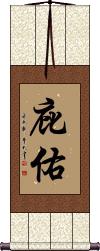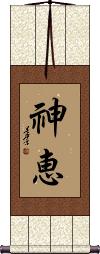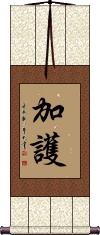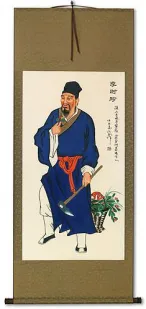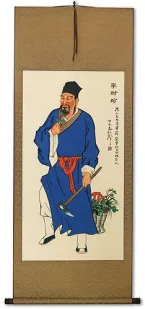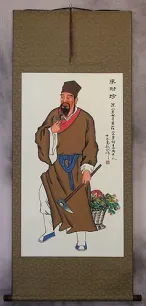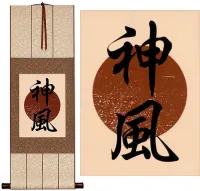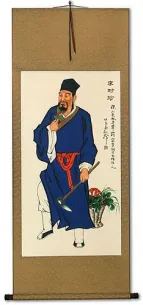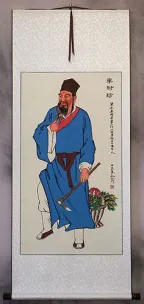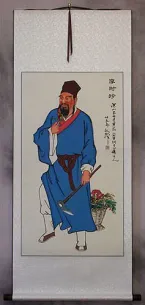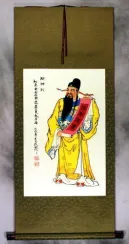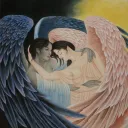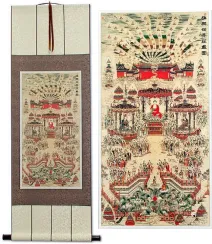Many custom options...
And formats...

Divine Blessing in Chinese / Japanese...
Buy a Divine Blessing calligraphy wall scroll here!
Personalize your custom “Divine Blessing” project by clicking the button next to your favorite “Divine Blessing” title below...
Divine Blessing
Grace of God / Divine Blessing
Divine Protection
加護 is Japanese for “divine protection” or “the saving grace of God.”
Please consider this blessing to be Japanese only. This can have the same meaning in the context of Buddhism in Chinese, but it's also a nickname for “intensive care” at Chinese hospitals.
Note: My Japanese translator says this is not commonly used in Japanese. I added this because a customer asked for it. There is no better Japanese phrase to express this idea - so this is it if you want it.
Grace from Heaven / Grace from God
This in-stock artwork might be what you are looking for, and ships right away...
Gallery Price: $200.00
Your Price: $79.88
Shen Nong
Divine Farmer
Oriental Wall Scroll
Discounted Blemished
Gallery Price: $58.00
Your Price: $32.00
Decorative Shen Nong
Divine Farmer Art Wall Scroll
Discounted Blemished
Gallery Price: $63.00
Your Price: $35.00
Gallery Price: $90.00
Your Price: $49.88
Gallery Price: $200.00
Your Price: $79.88
Not the results for Divine Blessing that you were looking for?
Below are some entries from our dictionary that may match your Divine Blessing search...
| Characters If shown, 2nd row is Simp. Chinese |
Pronunciation Romanization |
Simple Dictionary Definition |
冥加 see styles |
míng jiā ming2 jia1 ming chia myouga / myoga みょうが |
(1) divine protection; divine blessing; providence; (adjectival noun) (2) blessed; fortunate; lucky; (3) (abbreviation) (See 冥加金・1) monetary offering (to a temple or shrine); (4) (abbreviation) (hist) (See 冥加金・2) form of Edo-period business tax; (surname) Myōga The invisible aid of the spiritual powers. |
冥助 see styles |
myoujo / myojo みょうじょ |
(See 冥加・1) divine protection; divine blessing; providence |
功徳 see styles |
kudoku くどく |
(1) {Buddh} merit; virtuous deed; act of merit; act of charity; (2) {Buddh} divine reward (for virtuous deeds); grace (of the buddhas and gods); blessing; (3) {Christn} merit; meritum; (personal name) Kōtoku |
天福 see styles |
tiān fú tian1 fu2 t`ien fu tien fu tenpuku てんぷく |
(1) heavenly blessing; (2) Tenpuku era (1233.4.15-1234.11.5); (place-name) Tenpuku divine rapture |
神恩 see styles |
shinon しんおん |
divine blessing |
縁日 see styles |
ennichi えんにち |
temple festival; fair; fete day; day related to a particular deity and thought to bring divine blessing to those who celebrate it |
ご利益 see styles |
goriyaku ごりやく |
(1) grace (of God); divine favour; blessing; miracle; answer to a prayer; (2) benefit; (3) efficacy |
御利益 see styles |
goriyaku ごりやく |
(1) grace (of God); divine favour; blessing; miracle; answer to a prayer; (2) benefit; (3) efficacy |
Variations: |
goriyaku ごりやく |
(1) (honorific or respectful language) divine grace; divine favour; blessing; answer to a prayer; (2) (honorific or respectful language) benefit; help |
The following table may be helpful for those studying Chinese or Japanese...
| Title | Characters | Romaji (Romanized Japanese) | Various forms of Romanized Chinese | |
| Divine Blessing | 庇佑 / 庇祐 庇佑 | bì yòu / bi4 you4 / bi you / biyou | pi yu / piyu | |
| Grace of God Divine Blessing | 神恵 / 神惠 神恵 | shin kei / shinkei | ||
| Divine Protection | 加護 加护 | ka go / kago | jiā hù / jia1 hu4 / jia hu / jiahu | chia hu / chiahu |
| Grace from Heaven Grace from God | 神の恩恵 | kami no on kei kaminoonkei | ||
| In some entries above you will see that characters have different versions above and below a line. In these cases, the characters above the line are Traditional Chinese, while the ones below are Simplified Chinese. | ||||
Successful Chinese Character and Japanese Kanji calligraphy searches within the last few hours...
